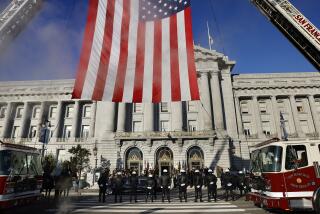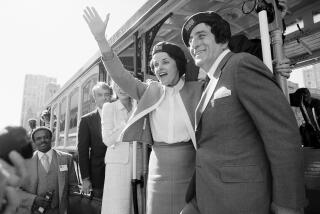S.F. Assassin Dan White Kills Himself
SAN FRANCISCO — Former Supervisor Dan White, the assassin of San Francisco Mayor George Moscone and Supervisor Harvey Milk, committed suicide in the garage of his home here Monday, just about one month short of the seventh anniversary of the sensational slayings.
Police said White’s body was discovered about 2 p.m. by a younger brother, Tom White.
White, 39, had called his brother, asking him to come over in the afternoon. When Tom White arrived, he found his brother’s body inside a white Buick sedan in the garage, with a garden hose running from the exhaust pipe into a partially opened car window.
Three handwritten notes were found taped to the car, one to his brother, another to his mother and a third to his wife of nine years, Mary Ann, 43, who was teaching at the Treasure Island Naval Base at the time the suicide was discovered.
An autopsy is scheduled today.
Served Five Years
On Nov. 27, 1978, White gunned down Moscone and Milk, the city’s first homosexual supervisor, in their City Hall offices. At his murder trial, White used a controversial diminished-capacity defense--claiming his addiction to junk food affected his judgment--and he was convicted of manslaughter. The verdict on the lesser charge triggered a night of rioting by gays in San Francisco. White was sentenced to seven years and eight months in prison for the crime, but served less than five years.
In the years since the killings, White had expressed no public remorse.
San Francisco Deputy Mayor Hadley Roff said he was familiar with White’s suicide note to his brother and it apparently contained no reference to the City Hall killings but rather mentioned arrangements for his funeral and for his family.
White’s attorney, Douglas Schmidt, said White had seen a psychiatrist “at least a couple of times” since his release from prison last year, but was receiving no regular care. Schmidt said White “always seemed vacant and depressed.”
Word of White’s death spread quickly through the city and reaction was mixed and emotional.
In San Francisco’s gay community, along Castro Street, shopkeepers taped the banner headline: “DAN WHITE DEAD,” to their windows as customers said they thought White had gotten his due. “I’m glad his conscience caught up with him,” Ragene Brown, 30, said.
In the neatly manicured neighborhood where White died, residents gathered in small knots to whisper quietly among themselves as they watched reporters and police hover about the garage at 150 Shawnee Ave.
Roff said White had recently returned from a trip to Ireland. While serving his sentence at Soledad State Prison, White often talked of taking such a trip.
“Apparently he had spent four months or so in Ireland and had recently returned to San Francisco,” Roff said. “We had heard that he was in Ireland and that his family was preparing to go relocate there with him. So this came as a surprise.”
The note to White’s brother “said something like, ‘I’m sorry to put you through all this,’ ” Roff said.
The contents of the two other suicide notes were not immediately disclosed.
White’s nine gunshots in November, 1978, not only killed the mayor and the city’s leading gay politician but it changed the fabric of San Francisco.
In the gay community, Milk became a martyr and the resentment of his death lingered. Each May 21, the anniversary of White’s conviction, has been marked with parades by gay activists, and there have been candlelight vigils every Nov. 27.
San Francisco politics moved away from the free-wheeling style of the liberal Moscone to the more business-oriented, middle-of-the-road atmosphere of Dianne Feinstein, the supervisor who was elevated to mayor when Moscone died, and has subsequently won her own term.
White had resigned as supervisor 17 days before the murders, saying he needed to devote more time to his private business. But shortly after he quit, White asked Moscone for his job back. Moscone refused, and Milk supported that decision.
Avoiding metal detectors at the City Hall entrance by slipping through a basement window, White walked into the mayor’s office and pumped four bullets into Moscone at close range. Reloading his .38-caliber revolver, he coursed a long marble hallway to Milk’s office and fired five shots into the supervisor. He had administered a point-blank shot in the head to each victim.
White’s defense during his murder trial was that before the murders, he had become severely depressed, in part because of eating junk food such as Twinkies. That diminished-capacity theory--which became widely known as the “Twinkie Defense”--led to his conviction for voluntary manslaughter. That night, thousands of gays rioted, besieging City Hall.
White was a model prisoner and was released after serving five years of his sentence. He was visited by his wife and children but was kept segregated from the rest of the inmates because he was a former police officer and because of the notoriety of his crime. His son, Rory, now 4, was conceived during a conjugal prison visit and was born with Downs syndrome.
According to his jailers, White became a student of Irish politics and culture and he wrote to friends of his desire to travel to Ireland. He did not seek psychological counseling nor did the once-devout Catholic attend Sunday Mass.
His parole to Los Angeles County on Jan. 6, 1984, touched off an initial wave of controversy, especially among gays, but soon White’s name disappeared from the news, and he lived out his one-year parole in seclusion in the San Fernando Valley. He grew a beard, dyed his hair and used a Scottish surname as he lived in obscurity. He did not try to find a job, however, parole officials said. He made three trips out of the county during that period--twice he went to Disneyland and once to Lake Tahoe.
After his one-year parole expired, White was free to live anywhere in the state. Although Feinstein and others publicly urged him to stay away from San Francisco, White has been living in the Bay Area with his wife and three children--Charlie, 7, Rory, and Laura, 1, who was born during White’s parole. Most recently he had been living in the same house he occupied at the time of the killings.
“He just kept to himself,” said Rick Rosa, who lived across the street. “For example, his wife would drive, and he would stay in the car until his wife drove it into the garage, so he did not have to get out.”
Rosa said White wore dark glasses constantly.
White was born the second son of a nine-child family of staunch Irish Catholics in the city’s Visitation Valley area. His father, a fireman, died when White was a teen-ager, and friends say the youth’s despondency over the death may have prompted his mediocre school career.
White spent several years working as a city fireman and police officer. In 1977, he put together a strong law-and-order campaign in his working-class neighborhood to win a supervisorial seat. He was 31.
The glory did not last long, however. The political neophyte battled often with the more hard-bitten political pros at City Hall, like Moscone, over many issues, including gay rights. He also clashed with Milk from time to time.
In October, 1978, he began considering his resignation, because his supervisor’s duties were taking too much time from a fast-food franchise he ran with other family members on Pier 39, a bayside commercial development. White also complained that he felt ineffectual in solving the city’s problems.
As the word of White’s suicide spread through City Hall Monday, most people reacted with shock. The news interrupted a meeting of the Board of Supervisors, when board President John Molinari was called to confer with police about the death.
“It’s opening up a lot of old wounds,” Molinari said. “There’s a lot of scar tissue left. It brings back the memories of that day and all the days following. You start remembering a lot of things. . . . I don’t think San Francisco will take any joy in his death.””
Supervisor Harry Britt, a gay who replaced Milk on the board, said he was not shocked by White’s death.
“It comes as no surprise that Dan White was a very disturbed man,” he said. “The assassination of Harvey Milk and George Moscone are proof of that fact. Dan White is in death as he was in life.”
However, Feinstein talked more sympathetically.
“I am very sorry to hear that Dan White has taken his life,” she said. “My sympathy goes to his widow, Mary Ann, and his children and his family who have suffered very much. This latest tragedy should close a very sad chapter in this city’s history.”
Gina Moscone, the mayor’s widow, declined comment.
But the mayor’s mother, Lee Moscone, said she would not “be surprised by anything” White did. “It was the only way out, I guess. . . . I guess it was very hard to live with himself.”
Mark A. Stein reported from San Francisco and Nancy Skelton from Los Angeles. Contributing to this story were Times staff writers Maura Dolan in Los Angeles and Julia Fortier and Norma Kaufman in San Francisco.
More to Read
Sign up for Essential California
The most important California stories and recommendations in your inbox every morning.
You may occasionally receive promotional content from the Los Angeles Times.










